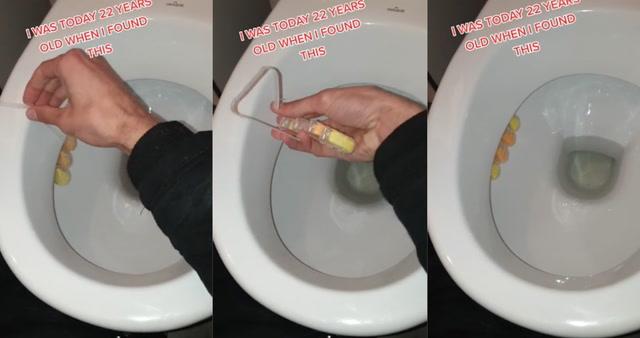TikTok's 'Product Overload' Trend Is Driving Experts Round The U-Bend
If you thought you knew everything there was to know about being tidy, cleaning TikTok will change your mind.
Yes, it’s a thing. And, boy, are these people keen to clean. One of the latest trends in the community is adding several products down a toilet or drain at the same time for a supercharged clean. Essentially, it’s “product overload” and there’s a hashtag to go with it, obviously.
Advertisement@cleaningmamabeeAnswer to @ender_wolfie “wHy Do YoU dO tHiS⁉️bec of comments like this🥺Charlotte, for you🤍pt 1/3 #toiletclean #productoverload #oddlysatisfying #fyp
♬ original sound - Cleaning Mama Bee🐝Some users go as far as accepting requests from their followers to clog their drains up with particular colour combinations.
No, we don’t quite get why seeing toilets and sinks being filled with chemicals is a satisfying watch either.
AdvertisementAnd while it seems like a harmless trend, experts are warning that “product overload” is not great for your loo – or you, never mind the environment.
@cleaningmamabee🍊💜collab w/@thesqueakyclean_traumarn follow her👏🏼 #fyp #cleaningtiktok #toiletclean #oddlysatisfying #cleaningasmr #productoverload #scrubbingasmr
♬ original sound - Cleaning Mama Bee🐝Environmental campaigners behind the annual Unblocktober campaign said the amount of products used in these TikToks in one sitting is enough to clean a residential toilet for up to six months – a certain cause for damage as well as a waste of resources.
Advertisement
Unblocktober aims to improve the health of our drains, sewers and seas, launched in 2019 and has seen more than 20,000 Brits across the country pledge to change their kitchen and bathroom habits at home and at work.
“Not only is it incredibly dangerous to mix chemicals in an uncontrolled setting without prior knowledge or expertise, but excessive use of cleaning products – even those deemed to be eco-friendly and safe to use in our kitchens and bathrooms – can have devastating effects on our environment,” said a spokesperson for the campaign.
Even if a cleaning product is labelled safe to use, it won’t have been tested in combination with every other cleaning product being poured down the drain.
“This means that homeowners won’t know the types of chemical reactions they will be creating, what happens to the pipes as these products move through the drains, or what effect this will have on local water systems as a whole,” they added.
AdvertisementThis could be bad news for your health – due to the noxious fumes you could inhale – but also for the environment. Even if you use your cleaning products as instructed, they can still have an adverse effect on our waterways and wildlife.
@incometwetrustI wore gloves🥺#JifRapChallenge #ColorCustomizer #productoverload #EatFreshRefresh #fyp #asmrsounds #asmrtiktoks #toiletscrubbing #toiletclean #fypシ
♬ original sound - incometwetrust“Phosphates are a chemical compound that can be found in many different cleaning products, and with varying amounts in each, they can cause upset to the balance of nutrients in the rivers and streams that help to provide our water supply,” the Unblocktober team explained. “This causes a depletion in aquatic oxygen supplies, thus altering the ecosystem.”
Additionally, using cleaning chemicals excessively may cause drainage systems and pipes to become blocked as the residue is unable to flush away correctly. “This can cause erosion and damage to the pipes, not to mention flooding if you are filling your toilet to the brim before flushing it,” they explained.
Instead of using several products, Unblocktober says people should consider using natural cleaning products such as white vinegar and bicarbonate of soda over artificial chemical cleaners as they cause less harm to the environment.
“We recommend that people be considerate of the products that they are using to clean their homes – especially if these are coming into direct contact with drainage systems and waterways. Remember to also consider the impact of your other bathroom habits, for example, only using as much toilet paper as needed and never flushing any wipes or sanitary products down.”
Suggest a correction More:EnvironmentHome and GardenGreen LivingTikTokCleaningHabiba Katsha
Life Reporter








